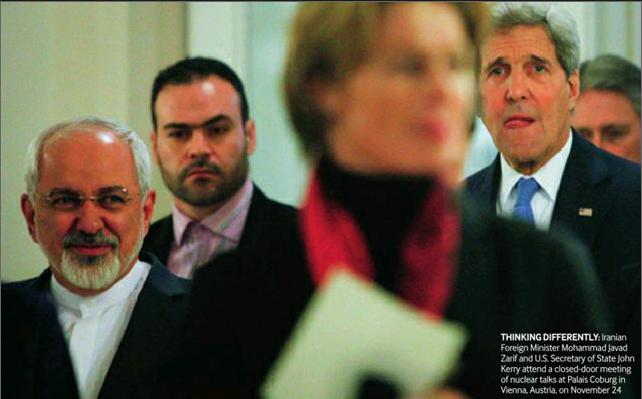Necessary Negotiations
2015-01-12ByQinTian
By+Qin+Tian

The parties involved in the Iranian nuclear talks announced a second extension of negotiations as they failed to reach a comprehensive agreement by the scheduled deadline of November 24. The agreement states that the interim Geneva deal—officially titled the Joint Plan of Action, which was sealed between Iran and the P5+1 countries on November 24, 2013—will also be extended to June 30, 2015. The P5+1 group involved with the Iranian nuclear negotiations comprises the five permanent members of the UN Security Council—the United States, Russia, China, Britain and France, plus Germany.
After its second extension following the previous one in July, the interim Geneva deal, which consists of a short-term freeze of portions of Irans nuclear program in exchange for decreased economic sanctions on the country, has become a de facto “permanent” deal. The seemingly prosaic result is in fact a clear reflection of the conundrum of the Iranian nuclear issue and strained relations between Washington and Teheran.
Security vs. sanctions
Ten rounds of official negotiations between Iran and the P5+1 group have already been held this year, in addition to numerous meetings among experts as well as bilateral and trilateral foreign ministers meetings. These combined efforts have yet to produce a breakthrough, suggesting that a final deal may be highly unlikely for the foreseeable future. One of the key sticking points between Iran and the United States, the two major negotiating parties, has to do with uranium enrichment.
The goal of the United States is to prevent Iran from obtaining nuclear weapons. However, Washington has acknowledged that Teheran already possesses the technical know-how to produce nuclear weapons, thus its specific objective is to ensure that the latter cannot produce enough highly enriched uranium to make a nuclear bomb within half a year.
Given that Iran has diluted its 20-percent enriched uranium stockpile in accordance with the Geneva deal, the United States is focused on reducing Irans current 19,000 centrifuges to a few thousand. Meanwhile, Iran wishes to safeguard its right to pursue uranium enrichment capability as a nuclear deterrence. After the conversion of its 20 percent-refined uranium, centrifuges have become Irans biggest trump card for its uranium enrichment capability. Irans supreme leader, Ayatollah Ali Khamenei, said in July that the country needs 190,000 separative work units to fuel a planned network of nuclear power plants, arguing that all existing 19,000 centrifuges should be kept. The gap between Iran and the United States is thus very wide.endprint
Both the United States and Iran take the sanctions seriously. The United States believes that tough energy and financial sanctions have forced Iran to compromise and return to the negotiating table. Thus, whether as a weight in the nuclear talks or to contain Teheran for the long term, the United States may choose to continue the sanctioning indefinitely. In fact, the United States has constantly stressed to the international community the importance of nuclear-related sanctions and even expanded the list of sanctions once again earlier this year.
On the part of Iranian authorities, the most important thing is to prevent external sanctions from severely damaging the countrys economy and thus threatening their rule. Otherwise, all their gains on the nuclear issue will be in vain. In the aftermath of the Geneva deal going into effect, Iran is now faced with fewer sanctions than ever before. For instance, $700 million in Iranian assets are being released on average monthly, and the interim agreement has also lifted sanctions on Irans petrochemical and automobile industries. These relaxations are of little help for the nations economic recovery, however. Thus, Iran has strongly argued for a lift of sanctions on key economic sectors including oil exports, fund transfers and energy investment.
Although Washington and Teheran seem unable to reach an agreement for the time being, the talks are not expected to break down. Under the Geneva deal, Iran has frozen portions of its nuclear program in an effort to alleviate the international communitys concern over the newest chapter of a potential nuclear crisis. As U.S. Secretary of State John Kerry said, Irans current nuclear capability is much less pronounced than one year ago.
The two negotiation extensions within half a year demonstrate that both sides would prefer to maintain talks rather than risk open conflict. If the talks are abandoned, Iran could restart or even upgrade its nuclear program, and the United States would likely respond with tougher sanctions or even military strikes. The stakes are high—for Washington and Teheran, the Middle East as a whole and even the world at large.
U.S. President Barack Obama has promised not to add new sanctions and, as per the Geneva deal, Iran will be able to export 1 million barrels of oil per day in the following seven months. The current situation, while not ideal, is acceptable to both sides.
Even if a comprehensive deal cannot be reached in the near future, maintaining theendprint
current talks and the interim agreement are common objectives for both sides.
Consequences of failure
If the talks fail, it would be a major blow for both Washington and Teheran. Iranian President Hassan Rouhani, who came to power last year, is strongly promoting the nuclear talks and constructive interactions with the outside world. The progress of the talks can be seen as the most important achievement of Rouhani thus far. If the negotiations hit a dead end, the Iranian president is certain to come under siege from domestic political opposition. This would not only hinder the Rouhani administrations governance and reform in other areas but also shake the foundations of their rule.
For President Obama, who has made few diplomatic achievements in the past six years, the Iranian nuclear issue may present one of only a few chances to shape his diplomatic legacy. Moreover, the talks are also important for the Obama administrations Middle East strategy adjustment to control turmoil in the region. Iran is a key player in almost all of the regions most pressing issues such as the Syrian civil war, Islamic State (IS) extremism as well as the reconstruction of Iraq, Yemen and Afghanistan. If the nuclear talks fail, Iran may become a liability for the United States Middle East strategy.
Additionally, the current situation in the Middle East is also favorable for Iranian nuclear talks. At the UN Assembly in September, German Foreign Minister Frank-Walter Steinmeier implicitly said that given the current international and regional situation, the Iranian nuclear talks must not fail. At the moment, the most urgent threat in the Middle East is the IS extremist movement. The United States and Iran have similar concerns over fighting against IS extremists in Iraq and Syria. Though the two countries have no official cooperation in combating the extremists, they have formed a tacit agreement. If the nuclear talks break down, that implicit agreement may also suffer.
Given the difficulties of the nuclear talks, and the regional and domestic situations facing Iran and the United States, an extension of the negotiations is necessary and inevitable. However, due to uncertainties, a lack of progress and even regression in the talks may become normal in the coming years. The two extensions already granted should not be repeated for a third time.
On the plus side, these extensions can help Washington and Teheran solidify their consensus and accumulate mutual trust, helping to keep the talks on the right track. However, repeated extensions will also waste the impetus of all negotiating parties and even the opportuni- ties for nuclear talks created by Rouhanis taking power. Thus, extensions also come with a price.endprint
Both the Obama and Rouhani administrations need to placate domestic opposition to the nuclear talks with a strong will and sophisticated methods. In the U.S. mid-term election in November, the Republicans won control of both the House of Representatives and the Senate in one stroke. The Republican Party has always been tough on Iran, with most sanctions bills against Iran having been proposed by Republicans. At present, Republicans have declared that nuclear talks cannot be extended again, and the outcome of the negotiations needs the approval of the Congress, which will certainly confine Obama administrations flexibility in nuclear talks. The same goes for Iran. Iranian hardliners think that in the past year, they have shown the United States enough respect and given Rouhani enough autonomy to deal with the nuclear issue, and are therefore opposed to making any further concessions.
It will not be surprising if phased results are achieved during the extension but not a real breakthrough. The governments of both sides must act skillfully in order to address this serious issue while serving their respective peoples.endprint
